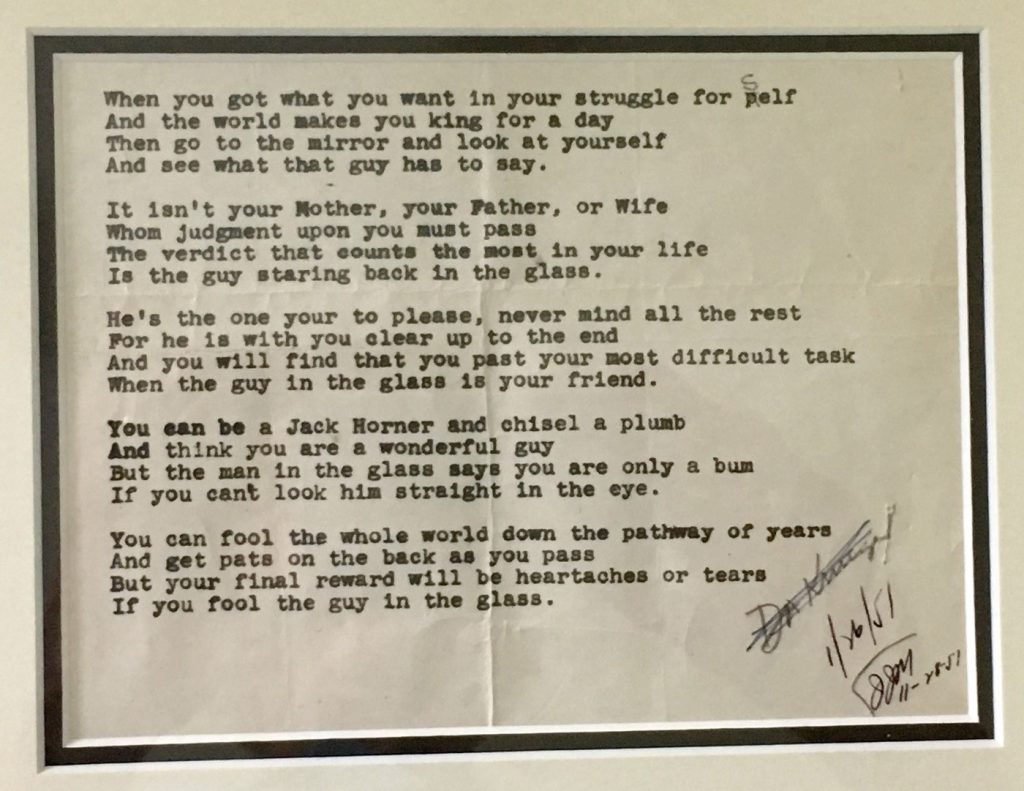The Man in the Glass by Peter Dale Wimbrow. Have you heard of it? We hear from Dave as he deconstructs one of his favourite poems and the valuable lessons it holds for coaches.
Hands up who knows who Peter Dale Wimbrow is?
Mmmm didn’t think there would many you (not due to the lack of intelligence of you, the reader, I need to stress. Rather because he is not a very well known guy). Peter Dale Wimbrow isn’t a household name but chances are you have come across one of his more famous pieces of work. That piece of work is the poem ‘The Man in The Glass’ (which I have included below). This poem holds a very valuable lesson for coaches.

I love this poem for a few different reasons. It always gives me an aspirational feeling that I can be better. It always brings role models to mind who I have respected through my life so far. And from a coaching perspective it appeals to my belief that reflection is a critical skill for coaches to develop, which is what I want to explore in this post.
I want you to think about the last time you coached…. It could be a training session or a match, or some other situation again, and I want you to reflect on how that session went. Answer questions like:
What was good about it?
What could have been improved?
What didn’t you like about it?
I am willing to bet that the majority of you reading this went immediately to how your athletes performed, and answered the questions above with thoughts similar to:
“Yea they did well”
“Yea I thought they looked good”
“Their energy was a bit off”
“I don’t think they grasped what we were trying to achieve”
As Mick McKinnon highlighted in his great blog on the Dreyfus model of skill acquisition, as coaches we move through different stages in our careers, moving from novice to expert in the wide variety of skills that coaching demands. Self-reflection is one of these skills, and as you shift through from being a novice reflector to a more proficient reflector, your focus on those questions above should start to shift from how they athletes trained to how you coached. As Wimbrow so eloquently puts it:
The verdict that counts the most in your life
Is the guy staring back in the glass
I believe that as coaches we need to switch our viewpoint so that when we reflect on a session with our athletes, our first thought is to analyse how well we coached. A colleague of mine, Craig Lewis, puts it best with his catch phrase:
If you are coaching at your best, chances are your athletes will train at their best
I love this quote. Just think about what this means for a second before you read on, because there is a lot that can be taken from it…..
If you are coaching at your best, here are some of the things I believe you would see:
Your instructions are clear & concise
Your questions challenge & provoke
Your session flows
Your activities align to what your aims are
You create a safe, engaging environment
Your culture validates all team members
You role model the behaviours and attitudes you want your athletes to live
If you coached a session and were able to demonstrate all of the above behaviours, then I would bet that your players would have trained at their best that day.
So when it comes to your reflection, next time you drive home after coaching and you’re running through your session in your mind; what worked & what didn’t, try to shift the focus from how the athletes trained to how you coached. When you start to shift the focus from how they trained to how you coached, you will start to better understand the key behaviours that will allow you to become a more consistent coach. You will see that:
When your instructions are clear, your athletes grasp activities faster
When your questions probe, your athletes will start to solve problems faster.
When your activities align to your overall goals, your athletes will understand the bigger picture faster.
When your session flows, your athletes will stay engaged for longer
By focusing on how you are coaching when you reflect you are focusing on the critical factors that will help your sessions be great day in, day out. This in turn will allow your athletes to train at their best more consistently. So hold yourself to a high standard and demand the best from yourself.
He’s the one your to please, never mind all the rest
For he is with you clear up to the end










